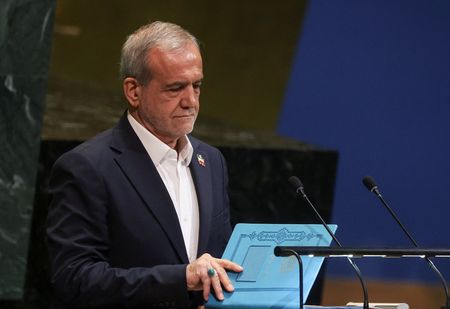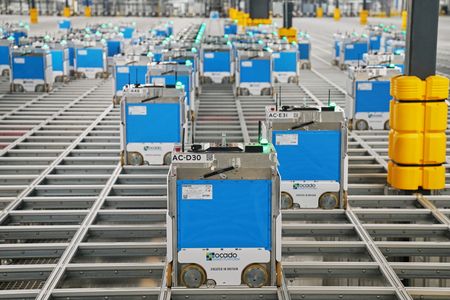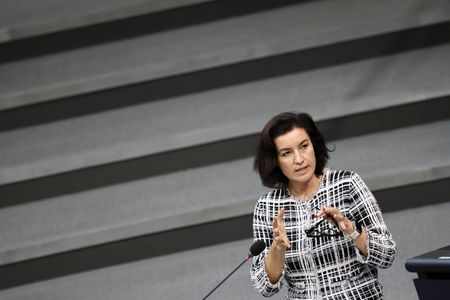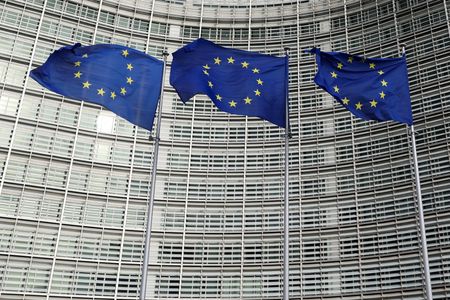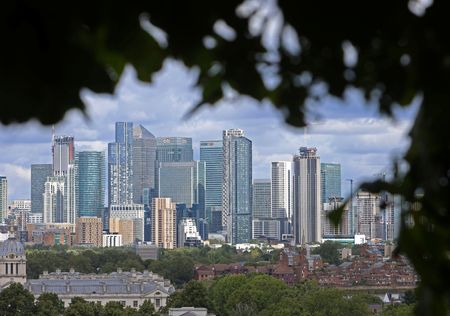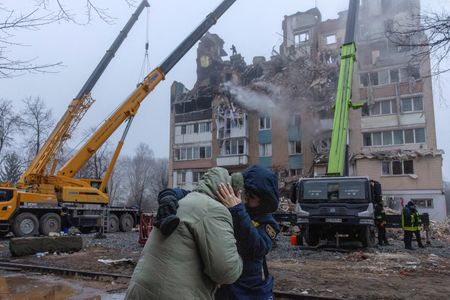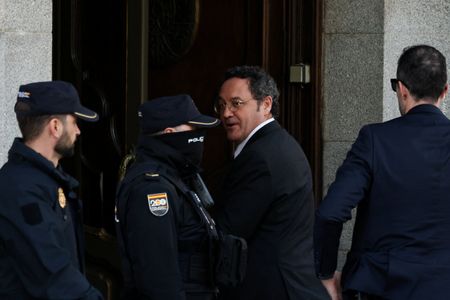By Parisa Hafezi
DUBAI (Reuters) -Iran has asked Saudi Arabia to persuade the U.S. to revive stalled nuclear talks, underlining Tehran’s anxiety over a possible repeat of Israeli airstrikes and its deepening economic woes, two regional sources with knowledge of the matter said.
A day before Crown Prince Mohammed bin Salman’s visit to the White House earlier this week, Iranian President Masoud Pezeshkian sent a letter to the de facto Saudi leader, Iranian and Saudi media reported on Monday.
In the letter, Pezeshkian said Iran “does not seek confrontation”, wants deeper regional cooperation and remains “open to resolving the nuclear dispute through diplomacy, provided its rights are guaranteed”, the sources told Reuters.
Iranian Foreign Ministry spokesperson Esmaeil Baghaei said on Wednesday that Pezeshkian’s message to the Saudi crown prince was “purely bilateral”. The Saudi government media office did not immediately respond to a request for comment.
Prior to the 12-day war in June triggered by Israeli airstrikes, during which U.S. forces struck three Iranian nuclear sites, Iran and the U.S. held five rounds of talks on the Islamic Republic’s disputed uranium enrichment programme.
Since the war, the negotiations have hit an impasse, even as both sides insist they remain open to a deal.
One of the sources in the Gulf said Iran is seeking a channel to reopen talks with Washington, and that the Saudi leader also favours a peaceful solution and conveyed that message to U.S. President Donald Trump during his visit.
“MbS (crown prince) also wants this conflict to be over peacefully. This is important to him, and he relayed this to Trump and said he is ready to help,” the Arab Gulf source said.
On Tuesday, the Saudi ruler told reporters: “We will do our best to help reach a deal between the United States and Iran.”
Riyadh and Tehran have been long-time strategic rivals in the Middle East, often backing opposing sides in regional proxy wars, until a China-brokered rapprochement in 2023 eased hostilities and restored diplomatic relations.
Saudi Arabia’s growing political weight has made it an increasingly decisive actor in regional diplomacy. Its deep security ties with Washington – and particularly the leadership’s close relationship with Trump – endow Riyadh with leverage few others in the Middle East possess.
Meanwhile, Iran’s regional standing has weakened over the past two years from devastating military blows inflicted by Israel on its allies Hamas in Gaza and Hezbollah in Lebanon, and the fall of its close ally, Syrian dictator Bashar al-Assad.
“Shifting mediation channels from countries such as Oman and Qatar to Saudi Arabia – a country with structural power, direct influence in the U.S. and a practical resolve to reduce tensions – is the best strategic decision under current circumstances,” said Hamid Aboutalebi, a former senior Iranian diplomat.
“These characteristics make Saudi Arabia an effective mediator and a genuine channel for conveying messages, a position that neither Oman nor Qatar nor the Europeans possess,” Aboutalebi wrote on X.
IRAN, U.S. SAY THEY BACK DIPLOMACY, BUT DEMANDS CLASH
The stakes for reviving nuclear diplomacy are high.
Conditions set by Tehran’s clerical establishment and the Trump administration remain sharply at odds, and a failure to narrow differences risks igniting a new regional war.
Gulf states, wary of being dragged into a broader conflict if Israel strikes Iran again, have previously acted as intermediaries – particularly Qatar and Oman.
Iran accuses Washington of “betraying diplomacy” by joining its close ally Israel in the June war, and insists that any deal must lift U.S. sanctions that have crippled its oil-based economy. Washington, meanwhile, demands that Tehran halt uranium enrichment on its soil, curb its ballistic missile programme and stop backing regional militia proxies – terms Iran has rejected.
Trump and Israeli Prime Minister Benjamin Netanyahu have warned they will not hesitate to strike Iran again if it resumes enrichment, a potential pathway to developing nuclear bombs.
Western powers and Israel accuse Tehran of using its declared civilian nuclear programme as a cover for developing bomb material. Iran says it seeks only peaceful atomic energy and vows a “crushing response” to any more Israeli aggression.
ECONOMIC ISOLATION, PUBLIC ANGER PUSH RULERS TO SHIFT COURSE
Iranian Supreme Leader Ayatollah Ali Khamenei, a hardliner who has the final say on foreign policy and the nuclear programme, has ruled out negotiations under threat.
“They want to impose their demands and advance their goals through military and economic pressure. This approach is unacceptable, and Iranians will not submit to it,” he said.
But that line-in-the-sand approach does not cut it for many ordinary Iranians struggling with the privations of daily life.
The economy is buckling under a collapsing currency, soaring inflation and chronic shortages of domestic energy and water – chiefly driven by years of mismanagement and sanctions.
Hemmed in by mounting public anger and the risk of further Israeli attack if nuclear diplomacy fails, Iran’s clerical elite is scrambling for a breakthrough with Washington to ease its crushing economic isolation, two senior Iranian officials, who like others spoke on condition of anonymity, told Reuters.
Kamal Kharrazi, a senior adviser to Khamenei, last week appealed to Trump to pursue “genuine talks with Iran grounded in mutual respect and equality”, according to Iranian state media.
(Reporting and writing by Parisa Hafezi; additional reporting by Samia Nakhoul and Timour Azhari; editing by Mark Heinrich)

